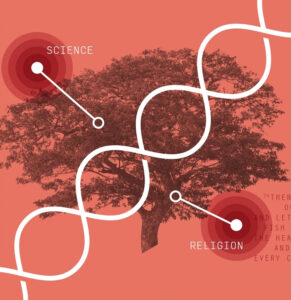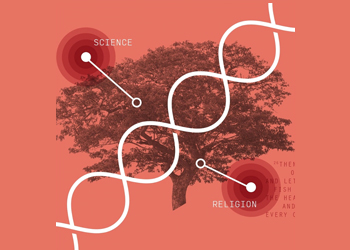Jainavenue is a medium to serve the spiritual path of Jainism
An Evolutionary Perspective
December, 2021 by Dominic Johnson & Michael Price in partnership with Issachar Fund
At least seven billion of the world’s nearly eight billion people today subscribe to some sort of religion, compared to only about 500 million atheists. Clearly, religious belief has enjoyed staying power in human history. But why? So far, answers to that question have been mostly based on opinions rather than empirical evidence.
At the turn of the 20th century, Harvard philosopher and psychologist William James was already concerned about the neglect of science in the study of religion. He produced a series of lectures that positioned religious experiences as a verifiable dimension of human nature. At the same time, he maintained, understanding religious experiences within the context of science should in no way diminish their value.
Today, 120 years later, religion remains understudied by scientists, and perceptions of science and religion as competing beliefs seem to have only strengthened over time, particularly in Western societies.
Recently, however, pioneering researchers in an emerging field of investigation are delving deeply and broadly to evaluate both religion and science as systems of belief that satisfy humans’ primal search for meaning and purpose. Research in this relatively new field is spearheaded by evolutionary anthropologists who are interested in the cultural development of societies – particularly why and how beliefs and behaviours vary, and how they develop over time.
Is the fulfilment of the deeply rooted human need for meaning unique to religion? Is it possible that science, and even atheism, have also come to function as meaning-making systems in today’s world? Are there particular social and environmental conditions today that favour science over religion … or religion over science?
These are some of the important questions that evolutionary anthropologists are exploring in a research initiative funded by the Templeton Religion Trust in partnership with Issachar Fund. The research is being led by Dominic Johnson, DPhil, Ph.D., professor of international relations at St. Anthony’s College, Oxford, and Michael Price, Ph.D., senior lecturer in psychology at Brunel University, London. Under their leadership, 18 subgrantee research projects are underway, involving early and mid-career academics, as well as senior scholars.
There’s a bigger question about the origins of meaning-making systems … are they serving some kind of useful, adaptive function that helps us achieve something as individuals or as communities and societies?
The Need for Meaning
“It’s very natural for us, as human beings, to search for purpose and meaning. It’s something we think about almost every day: What are we doing? What do we want to do? Why are we doing this? Often, this is associated with religious belief systems, and that’s important,” says Johnson.
“For example, religion seems to be very good at promoting cooperation among believers. The question becomes,” he continues, “is it religion that is doing that work? Or is it sharing an effective meaning-making system? Could it be that scientists are very good at cooperating with each other because they also share a meaning-making system, albeit one based more on the scientific method and a scientific approach to life? That has been much less studied.”
The Science of Adaptation
From earthworms in our garden to pigeons in our city streets, virtually all living creatures adapt. As individuals and societies, humans are no exception. We build fires, seek shelter, put on coats, or move if it’s cold. We change course to avoid obstacles in the road. We’re inclined to follow the norms and traditions of society and yet seize emerging opportunities to better our chances of reaching our goals.
Adaptation has long been key to human wellbeing and often survival. So, researching the factors that prompt adaptation – including the vast variety of religious and science-based beliefs – can help anthropologists understand why certain differences exist among cultures as well as why certain conditions promote the acceptance of religion over science, or science over religion.
“Human nature seems to be very much about creating groups and cohesion. And some sort of vehicle seems to be necessary to make that work,” says Johnson. “It’s a game in which religion seems to be king. It’s incredibly powerful at promoting cohesion, not least because of its motivational effects rooted in a logic of purpose and meaning. The research question is, ‘Are there alternatives which can do this as well?’”
“A criminal justice system is believed to be an adaptation that societies have evolved for conflict resolution.”
Looking Beyond Western Boundaries
The evidence is overwhelming that meaning-making systems are universal across societies, past and present. However, specifics vary considerably. In tribal, indigenous societies, for example, some people assimilate a wealth of knowledge about nature. Can that be categorized as science? Similarly, in such cultures, “religion” may be a totally alien concept, absent from language. However, belief in supernatural beings, powers, or occurrences may be common. Are such beliefs categorizable as religious?
“We believe anthropology is a very important discipline in this conversation,” Johnson asserts, “not only for its insights into contemporary societies, but also for its often-explicit focus on small-scale, indigenous human societies that are more similarly organized to those from which we evolved. They are a very important window to the kinds of cultural factors that may have been underlying social organization in our past — kin-based groups living in natural environments. We’re trying to understand meaning-making systems on their own terms. It’s very hard to do, but I think it’s crucial.
“Of course, we need analytical categories to do our work,” he continues. “But I think part of the value of our projects is trying to understand the diversity in the kinds of beliefs and concepts which we might call religion and science, but which really remind us how they’re different, how they’re similar, where they come from, and what their influences are. It’s fascinating to look at societies where a sharp division between religion and science is unclear, and they’re not differentiated in the same way that they are in western societies. What does that mean for our own understanding of religion and science?”
A few of the big questions being explored in various projects within this initiative include:
- How are different religions responding to the social pressures of climate crisis?
- Why do demonstrably false beliefs prevail in some kinds of societies and contexts more than others? For example, how do small-scale societies in China compare to their urban counterparts in this regard?
- Across a sample of 54 countries, does religious optimism have special effectiveness compared to secular and other forms of optimism in promoting wellbeing?
- How do transitions from small-scale to industrialized cultural environments influence meaning-making systems? For instance, how do the religious beliefs and traditions of native Tongans compare to those of Tongan Americans?
- What is the relative influence of religion versus science on how people cope with diseases like cancer? And are terminally ill people more likely to turn to “sacred cures” versus scientific cures?
- Why are norms of sexual morality so central to religious beliefs? Do similar or different norms exist independent of religion?
- Another powerful domain of cohesive group identity, values, taboos, and meaningful rituals is sport and sports teams. In what ways does sport as a meaning-making system differ and coincide with religious belief?
- Do conflictual beliefs about science and religion help establish cooperation and cohesion among atheists?
“Sources of Wonder and Awe and Life”
Alongside concurrent initiatives in sociology and psychology, these researchers have embarked on a relatively untrodden path. They’re confident, however, that their efforts can have significant and far-reaching implications for understanding the origins, development, and future of beliefs about science and religion, while also bringing to light new ideas and hypotheses for testing.
“People often talk about the religion and science debate as if religion is at risk of disappearing and being replaced by science,” says Johnson. “But perhaps the bigger question is what either of them provides us as an outlook on our place and purpose in the universe. In the past, we had religion to help us solve important questions of life, as individuals and communities. Today, we have science offering alternative perspectives. But perhaps they are both versions of an adaptive propensity we have as human beings to search for meaning, cause and effects, and the consequences of our actions. And this in itself is an important human trait.”
Describing both religion and science as “sources of wonder and awe and life,” Price agrees they need not be in conflict. “They’re not perceived that way in all societies around the world. So, the more we learn about the factors that either perpetuate that conflict or resolve it, the more control we’ll have in our own society to manage that conflict, however we see fit.”


Thanks for sharing. I read many of your blog posts, cool, your blog is very good.